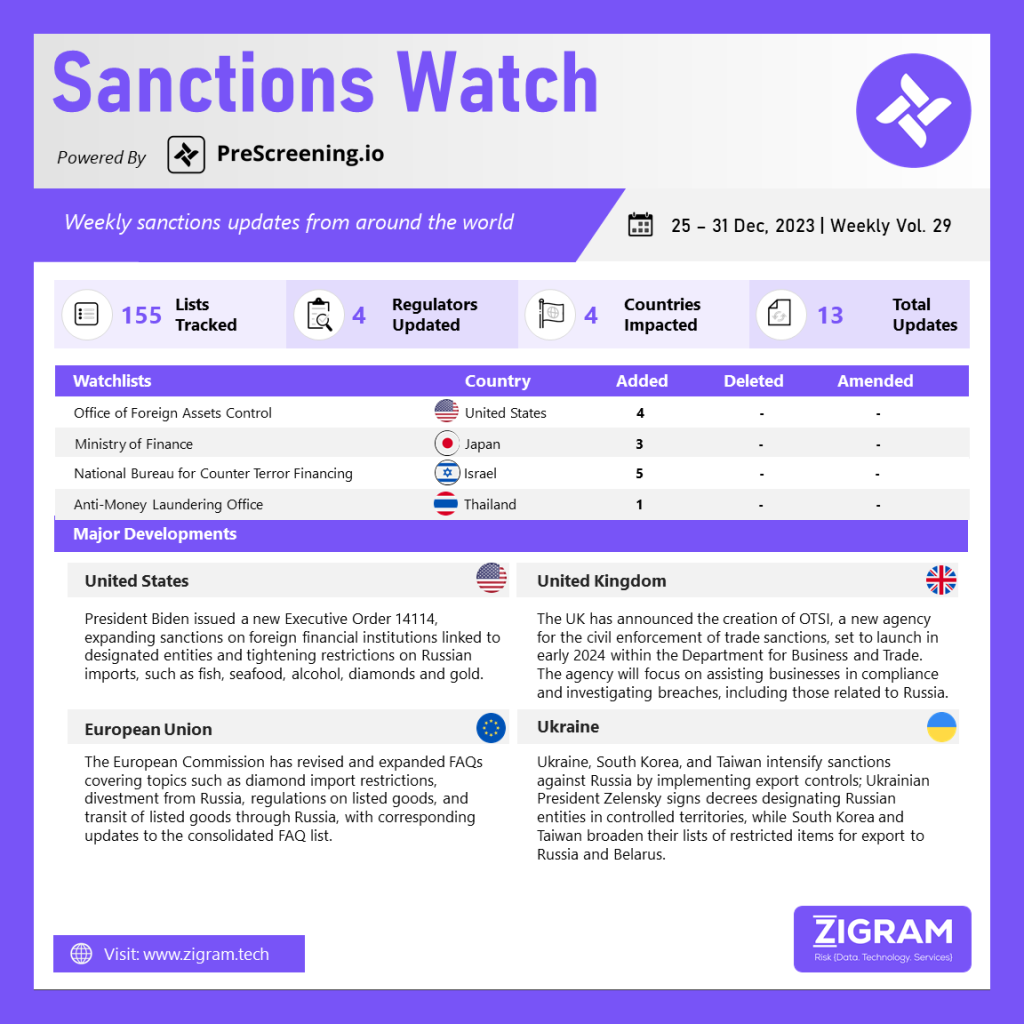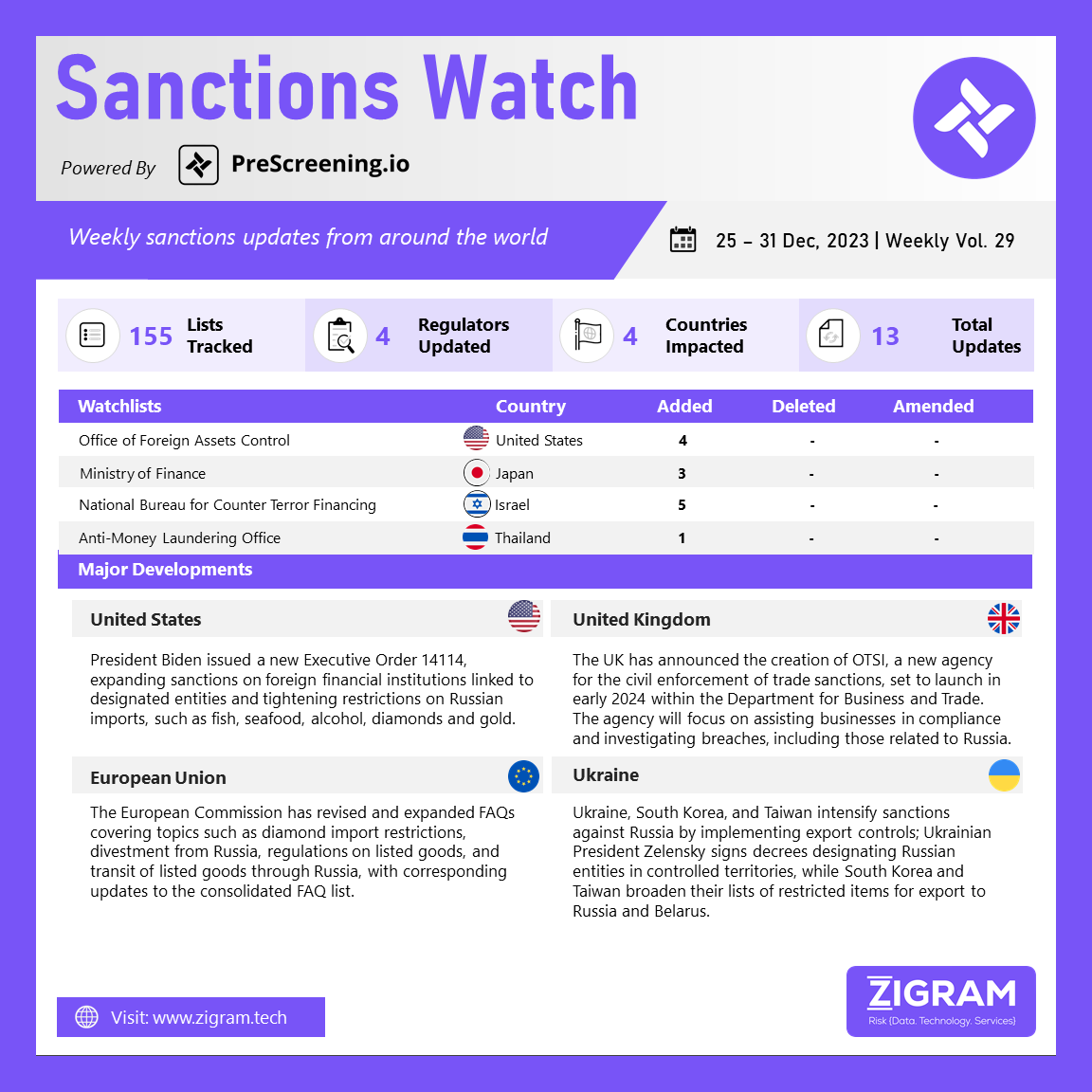Published Date:
In the latest edition of our Sanctions Watch weekly digest, we present significant updates on sanction watchlists and regulatory developments.
President Biden has recently issued Executive Order (EO) 14114 titled “Taking Additional Steps with Respect to the Russian Federation’s Harmful Activities.” This executive action serves as an amendment to EO 14024 and EO 14068. Notably, the amendments empower the imposition of secondary sanctions on foreign financial institutions, excluding those from the United States, found to be involved in significant transactions for specified entities designated under EO 14024. Additionally, these sanctions apply to institutions engaged in noteworthy transactions or services related to the Russian military-industrial base, broadly defined. Furthermore, the amendments extend restrictions on the importation and entry into the United States of Russian-origin fish, seafood, alcoholic beverages, non-industrial diamonds and gold. This executive order underscores the administration’s commitment to addressing and countering the Russian Federation’s detrimental activities through targeted economic measures and trade restrictions.
The United Kingdom’s Industry and Economic Security Minister has unveiled the establishment of the Office of Trade Sanctions Implementation (OTSI), a new agency geared towards the civil enforcement of trade sanctions, particularly those targeted at Russia. This significant development underscores OTSI’s role in assisting businesses in adhering to sanctions regulations. The agency will not only facilitate compliance but also engage in investigations to identify potential violations, impose civil penalties, and, when necessary, refer cases to HMRC for criminal enforcement. It is evident that OTSI’s authority is poised to resemble that of the Office of Financial Sanctions Implementation (OFSI) concerning financial sanctions. Scheduled for an early 2024 launch, OTSI will be housed within the Department for Business and Trade (DBT). Its mandate encompasses monitoring the activities of companies attempting to circumvent sanctions by utilizing third-country channels, reinforcing the government’s commitment to robust trade sanctions implementation and economic security.
The European Commission recently made additions and updates to its Frequently Asked Questions (FAQs), covering various crucial topics. Firstly, it addressed restrictions on diamonds, providing a comprehensive overview of the diamond import ban. The FAQs delve into different phases, weight thresholds, and regulations concerning diamond jewelry. Another significant update pertains to divestment from Russia, where the requirements for divestment derogations are outlined. Notably, the Commission emphasizes that selling a Russian subsidiary is deemed an indirect sale, contravening Regulation No 833/2014. The FAQs also shed light on aspects related to the imports, purchase, and transfer of listed goods. Additionally, the transit of listed goods via Russia is discussed in detail. These modifications have been incorporated into the consolidated list of FAQs, ensuring stakeholders stay informed about the latest regulatory developments.
Ukrainian President Zelensky has issued Decrees No. 850/2023 and No. 851/2023, signaling a firm stance against Russian influence in Ukrainian territories. These decrees target Russian entities and business figures involved in operations within regions controlled by Russia. Simultaneously, South Korea has amplified export restrictions to Russia and Belarus, expanding the list from 798 to 1159 products, including heavy construction equipment, batteries, and aircraft components, effective from early 2024. This reflects a broader international response to geopolitical tensions. Taiwan has also joined this global movement by extending its sanctions on Russia and Belarus, adding semiconductors, specific chemicals, and medicines to the list of restricted goods. These coordinated actions underscore a concerted effort among nations to employ economic measures in addressing geopolitical challenges and supporting countries like Ukraine in their pursuit of sovereignty.
- #UnitedKingdom
- #UnitedStates
- #OFAC
- #EU
- #ExecutiveOrder
- #TradeRestrictions
- #TradeSanctions
- #Compliance
- #OTSI
- #Russia
- #SanctionsWatch
- #RegulatoryCompliance
- #TradeCompliance
- #SanctionsEnforcement
- #GeneralTradeLicence
- #CivilPenalties
- #OFSI
- #DBT
- #Ukraine
- #UK
- #USA
- #G7
- #SouthKorea
- #Belarus #Semiconductors
- #Japan
- #Ukraine

